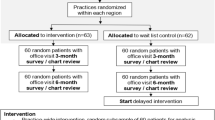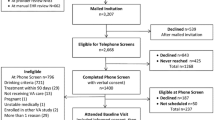Abstract
OBJECTIVE: To evaluate whether training primary care clinicians in maintenance care for patients who have changed their drinking influences practice behavior.
DESIGN: We randomized 15 physician and 3 mid-level clinicians in 2 primary care offices in a 2:1 design. The 12 intervention clinicians received a total of 2 1/4 hours of training in the maintenance care of alcohol problems in remission, a booster session, study materials and chart-based prompts at eligible patients’ visits. Six controls provided usual care. Screening forms in the waiting rooms identified eligible patients, defined as those who endorsed: 1 or more items on the CAGE questionnaire or that they had an alcohol problem in the past; that they have ‘made a change in their drinking and are trying to keep it that way’; and that they drank <15 (men) or <10 (women) drinks per week in the past month. Exit interviews with patients evaluated the clinician’s actions during the visit.
RESULTS: Of the 164 patients, 62% saw intervention clinicians. Compared with patients of control clinicians, intervention patients were more likely to report that their clinician asked about their alcohol history (odds ratio, 2.8; 95% confidence interval, 1.3, 5.8). Intervention clinicians who asked about the alcohol history were more likely to assess prior and planned alcohol treatment, assist through offers for prescriptions and treatment referral, and receive higher satisfaction ratings for the visit.
CONCLUSIONS: Systemic prompts and training in the maintenance care of alcohol use disorders in remission might increase primary care clinicians’ inquiries about the alcohol history as well as appropriate assessment and intervention after an initial inquiry.
Similar content being viewed by others
References
Buchsbaum DG, Buchanan RG, Lawton MJ, Elswick RK Jr.,Schnoll SH. A program of screening and prompting improves short-term physician counseling of dependent and nondependent harmful drinkers. Arch Intern Med. 1993;153:1573–7.
Barnes HN, Samet JH. Brief interventions with substance-abusing patients. Med Clin North Am. 1997;81:867–79.
Samet JH, O’Connor PG. Alcohol abusers in primary care: readiness to change behavior. Am J Med. 1998;105:302–6.
Pickens RW, Hatsukami DK, Spicer JW, Svikis DS. Relaspe by alcohol abusers. Alcohol Clin Exp Res. 1985;9:244–7.
Hunt WA, Barnett W, Branch LG. Relapse rates in addiction programs. J Clin Psychiatry. 1971;27:455–6.
Weisner C, Delucchi K, Matzger H, Schmidt L. The role of community services and informal support on five-year drinking trajectories of alcohol dependent and problem drinkers. J Stud Alcohol. 2003;64:862–73.
Stout RL, Rubin A, Zwick W, Zywiak W, Bellino L. Optimizing the cost-effectiveness of alcohol treatment: a rationale for extended case monitoring. Addict Behav. 1999;24:17–35.
Scott CK, Dennis ML, Foss MA. Utilizing recovery management check-ups to shorten the cycle of relapse, treatment reentry, and recovery. Drug Alcohol Depend. 2005;78:325–38.
Kimball HR, Young PR. Statement on the generalist physician from the American Boards of Family Practice and internal medicine. JAMA. 1994;271:315–6.
Weisner C, Matzger H. Missed opportunities in addressing drinking behavior in medical and mental health services. Alcohol Clin Exp Res. 2003;27:1132–41.
Friedmann PD, Saitz R, Samet JH. Management of adults recovering from alcohol or other drug problems: relapse prevention in primary care. JAMA. 1998;279:1227–31.
U.S. Preventive Services Task Force. Guide to Clinical Preventive Services. 2nd ed. Alexandria, VA: International Medical Publishing; 1998.
Samet JH, Rollnick S, Barnes H. A brief clinical approach after detection of substance abuse. Arch Intern Med. 1996;156:2287–93.
National Institute on Alcohol Abuse and Alcoholism. The Physician’s Guide to Helping Patients with Alcohol Problems. NIH Publication No. 95-3769. Washington, DC: National Institutes of Health; 1995.
Fleming MF, Barry KL, Manwell LB, Johnson K, London R. Brief physician advice for problem alcohol drinkers. A randomized controlled trial in community-based primary care practices. JAMA. 1997;277:1039–45.
Fiore MC, Bailey WC, Cohen SJ, et al. A clinical practice guideline for treating tobacco use and dependence: a US Public Health Service report. The Tobacco Use and Dependence Clinical Practice Guideline Panel, Staff, and Consortium Representatives. JAMA. 2000;283:3244–54.
Kristenson H, Ohlin H, Hulten-Nosslin MB, Trell E, Hood B. Identification and intervention of heavy drinking in middle-aged men: results and follow-up of 24–60 months of long-term study with randomized controls. Alcohol Clin Exp Res. 1983;7:203–9.
Kadden R, Carroll K, Donovan D, et al. Cognitive-Behavioral Coping Skills Therapy Manual: A Clinical Research Guide for Therapists Treating Individuals with Alcohol Abuse and Dependence. Project MATCH monograph series. National Institute on Alcohol Abuse and Alcoholism. DHHS publication no. (ADM)94-3724[3]. Washington, DC: Superintendent of Documents, US Government Printing Office; 1995.
Nowinski J, Baker S, Carroll K. Twelve Step Facilitation Therapy Manual: A Clinical Research Guide for Therapists Treating Individuals with Alcohol Abuse or Dependence. Project MATCH monograph series. National Institute on Alcohol Abuse and Alcoholism. DHHS publication no. (ADM)94-3724[1]. Washington, DC: Superintendent of Documents, US Government Printing Office; 1995.
Levinson W, Roter D. Can educational programs change the actual communication skills of practicing primary care physicians? The results of two types of continuing medical education programs. J Gen Intern Med. 1993;8:318–24.
Greco PJ, Eisenberg JM. Changing physicians’ practices. N Engl J Med. 1993;329:1271–3.
Soumerai SB, Avorn J. Principles of educational outreach (‘academic detailing’) to improve clinical decision making. JAMA. 1990;263:549–56.
Ewing JA. Detecting alcoholism: the CAGE questionnaire. JAMA. 1984;252:1905–7.
Mayfield D, McLeod G, Hall P. The CAGE questionnaire. Am J Psychiatry. 1974;131:1121–3.
Heather N, Luce A, Peck D, Dunbar B, James I. Development of a treatment version of the readiness to change questionnaire. Addict Res. 1999;7:63–83.
Sanchez-Craig M, Wilkinson DA, Davila R. Empirically based guidelines for moderate drinking: 1-year results from three studies with problem drinkers. Am J Public Health. 1995;85:823–8.
Adams A, Ockene JK, Wheeler EV, Hurley TG. Alcohol counseling: physicians will do it. J Gen Intern Med. 1998;13:692–8.
Pbert L, Adams A, Quirk M, Hebert JR, Ockene JK, Luippold RS. The patient exit interview as an assessment of physician-delivered smoking intervention: a validation study. Health Psychol. 1999;18:183–8.
Buchsbaum DG, Buchanan RG, Centor RM, Schnoll SH, Lawton MJ. Screening for alcohol abuse using CAGE scores and likelihood ratios. Ann Intern Med. 1991;115:774–7.
Bradley KA, Curry SJ, Koepsell TD, Larson EB. Primary and secondary prevention of alcohol problems: U.S. internist attitudes and practice. J Gen Intern Med. 1995;10:67–72.
Friedmann PD, McCullough D, Chin MH, Saitz R. Screening and intervention for alcohol problems. A national survey of primary care physicians and psychiatrists. J Gen Intern Med. 2000;15:84–91.
Brown RL, Saunders LA, Bobula JA, Lauster MH. Remission of alcohol disorders in primary care patients. Does diagnosis matter? J Fam Pract. 2000;49:522–8.
Carlson MJ, Gabriel RM. Patient satisfaction, use of services, and one-year outcomes in publicly funded substance abuse treatment. Psychiatr Serv. 2001;52:1230–6.
Druss BG, Rosenheck RA, Stolar M. Patient satisfaction and administrative measures as indicators of the quality of mental health care. Psychiatr Serv. 1999;50:1053–8.
Simpson DD. A conceptual framework for drug treatment process and outcomes. J Subst Abuse Treat. 2004;27:99–121.
Saitz R, Horton NJ, Sullivan LM, Moskowitz MA, Samet JH. Addressing alcohol problems in primary care: a cluster randomized, controlled trial of a systems intervention. The screening and intervention in primary care (SIP) study. Ann Intern Med. 2003;138:372–82.
Davis DA, Thomson MA, Oxman AD, Haynes RB. Evidence for the effectiveness of CME. A review of 50 randomized controlled trials. JAMA. 1992;268:1111–7.
Saitz R, Friedmann PD, Sullivan LM, et al. Professional satisfaction experienced when caring for substance-abusing patients: faculty and resident physician perspectives. J Gen Intern Med. 2002;17:373–6.
Maisto SA, Conigliaro J, McNeil M, Kraemer K, Conigliaro RL, Kelley ME. Effects of two types of brief intervention and readiness to change on alcohol use in hazardous drinkers. J Stud Alcohol. 2001;62:605–14.
Killeen TK, Brady KT, Gold PB, Tyson C, Simpson KN. Comparison of self-report versus agency records of service utilization in a community sample of individuals with alcohol use disorders. Drug Alcohol Depend. 2004;73:141–7.
Brown JB, Adams ME. Patients as reliable reporters of medical care process. Recall of ambulatory encounter events. Med Care. 1992;30:400–11.
Johnson JG, Spitzer RL, Williams JB, et al. Psychiatric comorbidity, health status, and functional impairment associated with alcohol abuse and dependence in primary care patients: findings of the PRIME MD-1000 study. J Consult Clin Psychol. 1995;63:133–40.
Sobell LC, Cunningham JA, Sobell MB. Recovery from alcohol problems with and without treatment: prevalence in two population surveys. Am J Public Health. 1996;86:966–72.
Cunningham JA, Breslin FC. Only one in three people with alcohol abuse or dependence ever seek treatment. Addict Behav. 2004;29:221–3.
Cunningham JA, Lin E, Ross HE, Walsh GW. Factors associated with untreated remissions from alcohol abuse or dependence. Addict Behav. 2000;25:317–21.
Author information
Authors and Affiliations
Corresponding author
Additional information
No conflicts of interest to declare.
Supported by the Robert Wood Johnson Foundation Generalist Physician Faculty Scholar Program (7621-01-00). Dr. Friedmann directs the Program to Integrate Psychosocial and Health Services, a Targeted Research Enhancement Program (TRP 04-179) of the VA Health Services Research & Development Service, at the Providence Veterans Affairs Medical Center (Rhode Island). Dr. Stein is a recipient of a Mid-Career Investigator Award from the National Institute on Drug Abuse. The views expressed in this article are the authors’ and not necessarily those of the Robert Wood Johnson Foundation, Department of Veterans Affairs, or National Institute on Drug Abuse.
Rights and permissions
About this article
Cite this article
Friedmann, P.D., Rose, J., Hayaki, J. et al. Training primary care clinicians in maintenance care for moderated alcohol use. J GEN INTERN MED 21, 1269–1275 (2006). https://doi.org/10.1111/j.1525-1497.2006.00611.x
Received:
Revised:
Accepted:
Issue Date:
DOI: https://doi.org/10.1111/j.1525-1497.2006.00611.x




